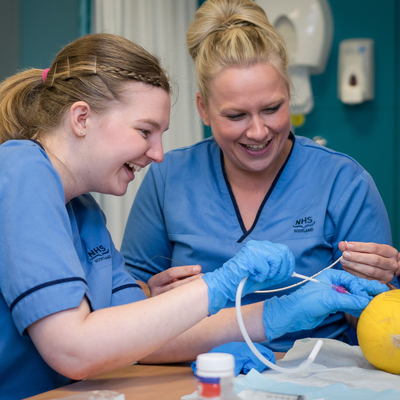OU Practice assessment documentation
All Scottish Higher Education Institutes (HEIs) have worked collaboratively to produce a single Practice Assessment Document (PAD) for Scotland. Currently the OU PAD is paper based and not electronic.
The PAD is an integral part of the learning process. It is not simply a catalogue of learning activities; rather, will provide clear evidence of the learning that has occurred. The PAD provides an opportunity to demonstrate evidence of learning from academic activities and application to practice learning as well as from practice experience; it is essential to demonstrate achievement of the NMC Future Nurse: Standards of Proficiency for Registered Nurses (NMC, 2018). You should read and be familiar with the introduction section of the PAD.

Practice Supervisors (PS), Practice Assessors (PA) and Practice Tutor/Academic Assessors (PT/AA) within OU
You will have a number of practice learning experiences throughout your programme. During your PLEs responsibility for supervision and assessment will lie with practice supervisors, a practice assessor and an academic assessor (NMC 2018c, p8).The PS, PA and PT/AA will work collaboratively to enable you to learn and safely achieve proficiency and autonomy in your professional role.
Role of the OU Practice Tutor/Academic Assessor
Unlike other universities who provide students with AA’s only, the Open University provides students with PT/AA’s. They are Registered Nurses with appropriate experience in the field of practice that students are studying. Although the role includes two titles, the role itself is undertaken by one person. It is an NMC requirement that “all students on an NMC approved programme are assigned to a different nominated academic assessor for each ‘part’ of the education programme” (NMC 2018c, p8) and therefore your allocated PT/AA will change as you progress through each level of the programme.
PT/AA’s work closely with the nominated PS and make recommendations for student progression based on their assessments, PAD and other resources. They also collate and confirm your achievement of proficiencies and programme outcomes in the academic environment for each Part of the programme. The PT element of the role also enables them to provide you with pastoral support within practice learning environments if required.
You will meet with those who will be supporting you in practice (PS, PA, PT/AA) at the beginning of your practice experience to ensure you have learning opportunities available and appropriate supervision and support in place. Further meetings will take place between the student, your PS, PA (if required) and your PT/AA midway and at the end of each Part of the programme. At the final meeting your PA and PT/AA collate and confirm that all academic results and practice requirements have been met and recommend whether you should progress to the next part of the programme.
Practice Assessment Interview (PAI)
During each Part of the programme, you will undertake a PAI as part of the assessment strategy. The PAI will take place in practice placement 2, with a possibility to repeat in placement 3 if needed.
The PAI is a short professional discussion (20 minutes) held between the student and their PT/AA. The student’s PA will be in attendance and contribute to the overall mark for the student, but they should not participate in the discussion. The PT/AA will contact the PA prior to the meeting to provide further information on the topic and marking criteria.
You are informed of the topic at least six weeks before the PAI. The topics for discussion will relate to professional values listed in the PAD and will also reflect module materials of that stage. More information can be obtained on your K104, KYN210 and KYN326,7,8 module websites.



